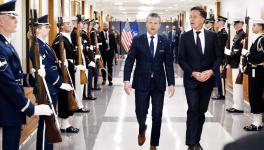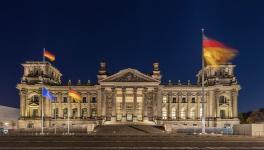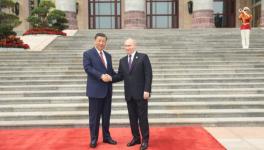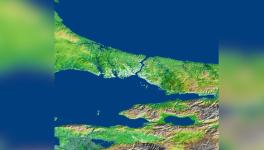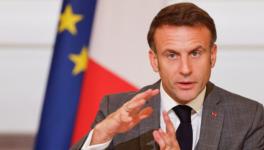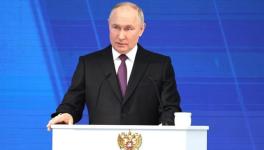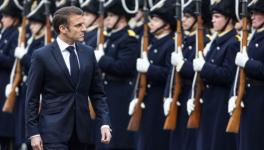NATO Runs Into Multipolar World Order
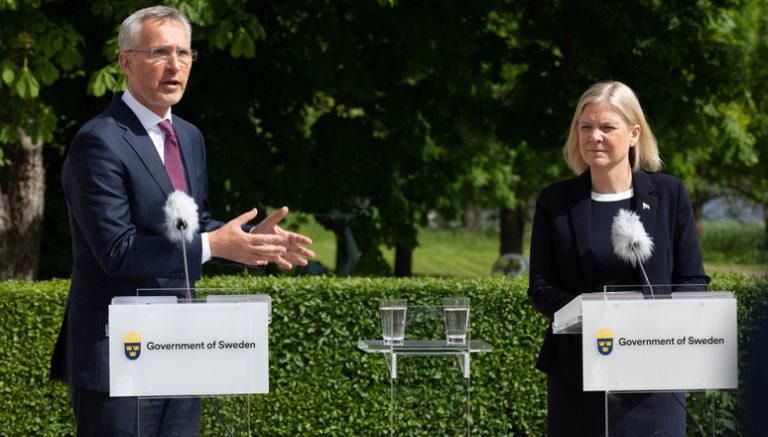
Joint press conference by NATO Secretary General Jens Stoltenberg (L) and Prime Minister of Sweden, Magdalena Andersson (R), June 13, 2022
Germans say the moment of truth for most children comes at the end of Grade 4 when primary education ends in Grundschule. By that reckoning, North Atlantic Treaty Organisation (NATO) at 73 is in “second childishness and mere oblivion/sans teeth, sans eyes, sans taste, sans everything” — to borrow from Jaques’ famous soliloquy in Shakespeare’s play, As You Like It.
Certainly, the “big manly voice” of the NATO Secretary-General Jens Stoltenberg was rather muted when he publicly admitted on Monday that Sweden’s and Finland’s NATO membership bids may not be resolved in time for the alliance’s summit later this month in Madrid, due to Turkey’s objection.
Speaking at a press conference with the Swedish Prime Minister Magdalena Andersson in Stockholm, Stoltenberg parried: “The Madrid summit was never a deadline, but at the same time, we are working to find the solution as soon as possible. But when many countries or several countries are involved, there is no way to say exactly when these countries are going to be able to agree.”
This is a massive retraction from his bullish tone on May 18 when Stoltenberg hailed the formal submission of application of membership by Sweden and Finland on that day as an “historic moment which we (NATO) must seize.”
A beaming Stoltenberg said as he stood alongside Finland’s and Sweden’s ambassadors to NATO, “This is a good day at a critical moment for our security.” The context was indeed truly dramatic — Russia had demanded in December the legal guarantee that NATO stops expanding toward its borders, which the alliance simply ignored Stoltenburg was defiantly announcing yet another NATO expansion.
Stoltenberg was turbocharged, as it were, since he had the back of US President Joe Biden who, flanked by Swedish Prime Minister Magdalena Andersson and Finnish President Sauli Niinisto, in the Rose Garden of the White House on the same day, May 18, also announced that the two Nordic countries had the “full, total, complete backing” of the US for their application to join the NATO.
Biden said he was sending paperwork to Congress on the same day to facilitate ratification of their bids and proclaimed, ”Finland and Sweden make NATO stronger. And a strong, united NATO is the foundation of America’s security.” Indeed, the party was awesome.
But neither Biden nor Stoltenberg anticipated a worm in the apple would spoil the party. They didn’t pay due attention that a week earlier, even as news was breaking out about another NATO expansion, Turkish President Recep Erdogan sounded a mildly dissenting note, “We are following developments concerning Sweden and Finland, but we are not of a favourable opinion.”
Erdogan since explained his opposition by citing Sweden and other Scandinavian countries’ brazen support for Kurdish militants and others whom Turkey considered to be terrorists. He added that he did not want to repeat Turkey’s past “mistake” when it agreed to readmit Greece into NATO’s military wing in 1980 and subsequently the alliance allowed Greece “to take an attitude against Turkey” with NATO backing.
Erdogan did not say he would block any accession attempts by the two Nordic nations, but his hint was ominous enough, considering that NATO is required to take all decisions by consensus. The White House press secretary simply noted that Washington was “working to clarify Turkey’s position.” Secretary of State Antony Blinken was scheduled to meet his NATO counterparts, including the Turkish foreign minister, that weekend in Germany.
Conceivably, the White House, which is used to taking all major decisions and most minor decisions on behalf of the alliance, underestimated that Erdogan was throwing yet another temper tantrum and some ego massaging would pacify him. Thus, Swedish and Finnish foreign ministers flew into Ankara on a symbolic voyage.
But by then, Erdogan had thought through and Turkey had specific demands to make on the repatriation of militant Kurdish activists who enjoyed free run in the Scandinavian countries. Erdogan probably knew these were tall to fulfil. Turkey had made 10 extradition requests to Finland between 2019 and 2022 and Helsinki acceded to only two. As for Sweden, its government requires the support of Kurdish lawmakers to stay in power and the deal that ruling Social Democrats in Stockholm struck with Kurdish MPs last November included a public pledge to this effect.
Clearly, Washington and Brussels (and Stockholm and Helsinki) were bewildered. In Erdogan’s calculus, the NATO or the US cannot afford a face-off with Turkey, not only because of the alliance’s irreplaceable bases in Turkey but also because of Turkey’s control of access to the Black Sea under the Montreaux Convention Regarding the Regime of the Straits (1936). Besides, Erdogan calculates that this is as good a moment as any to clean up the bases of the Kurdish militant groups (affiliated to the PKK) in northern Syria along the border regions.
Simply put, Turkey is leveraging its status as a “swing state” in the present-day multipolar setting by planning a new operation in northern Syria, where Kurdish factions backed by Washington and Moscow both had previously opposed Ankara’s aims.
On May 30, in a call with Ibrahim Kalin, Erdogan’s Spokesperson and Chief Advisor, US National Security Advisor Jake Sullivan urged “Turkey’s continued direct talks with Sweden and Finland to resolve concerns over their applications for NATO membership, which the US strongly supports,” and in the same breath also “reiterated the importance of refraining from escalation in Syria to preserve existing ceasefire lines and avoid any further destabilisation.”
According to the Turkish readout, however, Kalin, pushed back, pointing out that “countries that seek to become a member of NATO should adopt the Alliance’s values and principles on security and combatting terrorism,” and that Sweden and Finland “have to take concrete steps regarding the terrorist organisations that threaten Turkey’s national security.”
As for the planned operation in northern Syria, Kalin said, “the PKK/PYD/YPG terrorist organisation continued to pose a threat to Turkey’s national security and Syria’s territorial integrity” and Turkey would “determinedly maintain its fight against all the terrorist organisations.”
Meanwhile, Erdogan has been frequently holding conversations with President Putin on a range of issues concerning Ukraine and Turkish-Russian bilateral cooperation and it is entirely conceivable that Sweden and Finland’s NATO bid figured. Turkey has refused to sanction Russia and even allows the Mir payment system bypassing SWIFT. All the Russian projects in Turkey are on course, including the $20 billion nuclear power plant at Akkuyu, which is expected to generate around 10% of Turkey’s electricity.
Recently, Turkey and Russia began working on the export of grain out of Ukraine, undercutting the Western plans to force Russia to lift its sea blockade of Ukraine’s Black Sea ports. Foreign Minister Sergey Lavrov travelled to Turkey in his plane to discuss the matter. Erdogan plans to speak with Putin next week on setting up a “grain corridor” from Black Sea.
On the other hand, Erdogan has begun openly voicing criticism of the Western policies in Ukraine and is trying to consolidate its role as a mediator in Russian-Ukrainian negotiations. It is impossible to expel Turkey from NATO and Moscow sees advantages in it. Erdogan remains the most popular politician in Turkey. Obviously, he has no reason to feel afraid to speak on equal terms with Biden or Stoltenberg.
On June 13, Erdogan repeated that Turkey will not compromise on the accession of Sweden and Finland. And Stoltenberg had to finally admit publicly that NATO, while promising Finland and Sweden a quick entry into the alliance, did not expect such a tough position by Turkey.
It is against this backdrop of a bruising run-in with the emergent multipolar world order that two back-to-back meetings are due today and tomorrow at Brussels — the so-called Ramstein format to be chaired by US Defence Secretary Lloyd Austin and the NATO defence chiefs’ meeting. The choice before NATO is whether or not to ramp up heavy armament supplies to Kiev.
In particular, there is a pending American proposal for establishing a “no-fly” zone over Western Ukraine with the help of NATO air forces that could be used for large-scale supplies from the EU and the US. The idea has been in limbo due to the perceived risk of a direct conflict with Russia. But the US cannot afford NATO to be rendered ineffectual.
Get the latest reports & analysis with people's perspective on Protests, movements & deep analytical videos, discussions of the current affairs in your Telegram app. Subscribe to NewsClick's Telegram channel & get Real-Time updates on stories, as they get published on our website.











